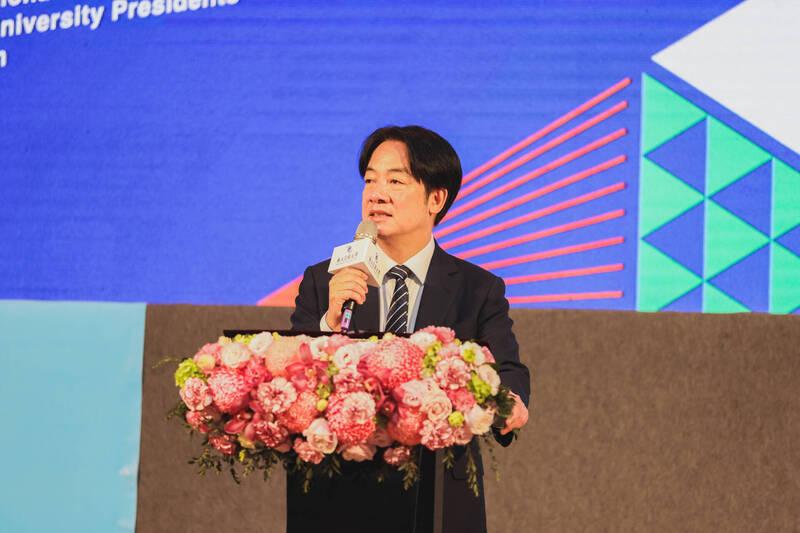Taiwan’s democracy and academic independence are invaluable, and universities should be cautious about exchanges with China, President William Lai (賴清德) said today at an academic conference in Yilan.
He made the comments at the 2025 National Conference for the University Presidents of Taiwan, the same week as officials warned about Chinese Communist Party (CCP) attempts to influence Taiwanese university students and blacklisted two Chinese universities.
Minister of Education Cheng Ying-yao (鄭英耀) yesterday said Taiwanese institutions would be banned from collaborating with Huaqiao University in Xiamen and Quanzhou, as well as Jinan University in Guangzhou after national security officials found that both schools are under the direct control of the CCP political warfare bureau.

Photo courtesy of the Ministry of Education
Additionally, during an eight-day educational trip in China's Sichuan Province for Taiwanese students on Tuesday last week, China’s Taiwan Affairs Office Deputy Director Wu Xi (吳璽) told participants they should oppose Taiwanese independence and advocate for the good of the Chinese people.
A government official speaking on condition of anonymity warned that such trips are part of “united front” tactics by the CCP.
Lai laid out four key goals for Taiwan’s educational sector — ensuring that no student is left behind, promoting collaborative development among universities, encouraging innovation in higher education and increasing government support for institutions.
The Ministry of Education must allocate resources to provide equal opportunities for all students, even those from rural areas; ensure universities are fostering interdisciplinary talent, promote new possibilities for academic development, support students in pursuing international experiences and assist in setting up private-public collaborations, Lai said.
One of the initiatives Lai cited was the Taiwan Global Pathfinders Initiative, to which the government has allocated NT$10 billion (US$306 million) to fund opportunities for Taiwanese youth to travel overseas.
To raise awareness of national defense among the entire population, the Presidential Office established the Whole-of-Society Defense Resilience Committee, Lai said.
Regarding China, Lai said that institutions must be aware of the risks and join the government in protecting the country’s core key technologies, research and competitiveness.
Taiwan’s freedom and democratic way of life are “precious” assets, Lai added.

Taiwan yesterday condemned the recent increase in Chinese coast guard-escorted fishing vessels operating illegally in waters around the Pratas Islands (Dongsha Islands, 東沙群島) in the South China Sea. Unusually large groupings of Chinese fishing vessels began to appear around the islands on Feb. 15, when at least six motherships and 29 smaller boats were sighted, the Coast Guard Administration (CGA) said in a news release. While CGA vessels were dispatched to expel the Chinese boats, Chinese coast guard ships trespassed into Taiwan’s restricted waters and unsuccessfully attempted to interfere, the CGA said. Due to the provocation, the CGA initiated an operation to increase

CHANGING LANDSCAPE: Many of the part-time programs for educators were no longer needed, as many teachers obtain a graduate degree before joining the workforce, experts said Taiwanese universities this year canceled 86 programs, Ministry of Education data showed, with educators attributing the closures to the nation’s low birthrate as well as shifting trends. Fifty-three of the shuttered programs were part-time postgraduate degree programs, about 62 percent of the total, the most in the past five years, the data showed. National Taiwan Normal University (NTNU) discontinued the most part-time master’s programs, at 16: chemistry, life science, earth science, physics, fine arts, music, special education, health promotion and health education, educational psychology and counseling, education, design, Chinese as a second language, library and information sciences, mechatronics engineering, history, physical education

The Chinese military has boosted its capability to fight at a high tempo using the element of surprise and new technology, the Ministry of National Defense said in the Quadrennial Defense Review (QDR) published on Monday last week. The ministry highlighted Chinese People’s Liberation Army (PLA) developments showing significant changes in Beijing’s strategy for war on Taiwan. The PLA has made significant headway in building capabilities for all-weather, multi-domain intelligence, surveillance, operational control and a joint air-sea blockade against Taiwan’s lines of communication, it said. The PLA has also improved its capabilities in direct amphibious assault operations aimed at seizing strategically important beaches,

‘MALIGN PURPOSE’: Governments around the world conduct espionage operations, but China’s is different, as its ultimate goal is annexation, a think tank head said Taiwan is facing a growing existential threat from its own people spying for China, experts said, as the government seeks to toughen measures to stop Beijing’s infiltration efforts and deter Taiwanese turncoats. While Beijing and Taipei have been spying on each other for years, experts said that espionage posed a bigger threat to Taiwan due to the risk of a Chinese attack. Taiwan’s intelligence agency said China used “diverse channels and tactics” to infiltrate the nation’s military, government agencies and pro-China organizations. The main targets were retired and active members of the military, persuaded by money, blackmail or pro-China ideology to steal